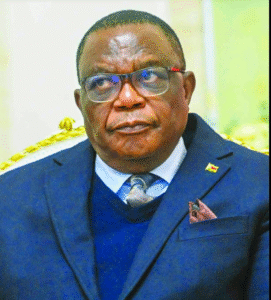SADC EMERGENCY SUMMIT ON ZIMBABWE SET TO TEST REGIONAL CREDIBILITY AND RESOLVE
In a high-stakes move underscoring deep regional concern, the Southern African Development Community (SADC) is convening an extraordinary summit this Wednesday to address Zimbabwe’s increasingly volatile post-election crisis. Chaired by Angolan President João Lourenço, the summit, held virtually, marks a pivotal moment for regional diplomacy amid rising tension in Southern Africa.
While the agenda, as obtained by The NewsHawks, formally includes updates on the security situation in the Democratic Republic of Congo and SADC troop deployments, it is Zimbabwe’s political implosion that looms largest. The summit will span three hours, beginning at 10 a.m. Botswana time, and promises to be a defining moment in SADC’s history.
The catalyst for this urgent meeting is Zimbabwe’s deeply contested general election held on 23 and 24 August 2023. The process, marred by serious irregularities and condemned by observer missions — including SADC’s own — has left the country politically fractured and economically on edge. Allegations of electoral fraud and vote manipulation have worsened Zimbabwe’s international standing and compounded its economic woes, pushing the region into diplomatic overdrive.
At the centre of the storm is the intensifying standoff between President Emmerson Mnangagwa and opposition leader Nelson Chamisa of the Citizens Coalition for Change (CCC). Chamisa has dismissed the election results as a “gigantic fraud”, accusing the ruling ZANU PF and a shadowy network of state actors of orchestrating a rigged outcome.
The brewing political crisis has drawn the attention of global players. In South Africa, President Cyril Ramaphosa has reportedly engaged Mnangagwa in backchannel discussions, fearing the destabilising effects Zimbabwe’s unrest could have on his own 2024 election campaign. Elsewhere, the United Kingdom’s House of Lords has openly criticised Zimbabwe’s elections, and even Russia has weighed in — a testament to the far-reaching diplomatic ripples of this crisis.
The summit programme will begin with formalities, including opening prayers and national anthems, before transitioning to remarks by SADC Executive Secretary Elias Magosi and chairperson João Lourenço. But it is the deliberative session that carries the greatest weight. Although Zimbabwe is not named explicitly in the official agenda, sources confirm that its post-election crisis is the summit’s central focus.
Zimbabwe’s Foreign Affairs Ministry and SADC’s headquarters in Gaborone have confirmed the meeting’s timing and agenda through internal correspondence dated 19 October. Insiders say the urgency and pressure behind the summit signal that regional patience with Mnangagwa’s government may be wearing thin — a significant shift in a bloc often accused of shielding incumbents.
The implications of this summit are massive. For SADC, it is a chance to demonstrate that it can uphold democratic norms and be a credible custodian of electoral integrity in the region. For Zimbabwe, it presents a rare moment of accountability — or at least a reckoning — in a political landscape where impunity has often prevailed.
The CCC and civil society actors will be closely monitoring the outcomes, hoping the summit yields more than just platitudes. There are growing calls for SADC to push for an independent audit of the elections or initiate talks between Mnangagwa’s government and the opposition. Anything less, critics argue, would amount to tacit approval of Zimbabwe’s descent into de facto authoritarianism.
This emergency summit is not just about Zimbabwe. It is a litmus test of SADC’s relevance and resolve. Can the regional bloc act decisively in the face of democratic backsliding, or will it once again fall back on quiet diplomacy and non-interventionism?
As the region and the world await the summit’s communique, the stakes could not be higher. Zimbabwe’s political future, and SADC’s credibility, are on the line.



